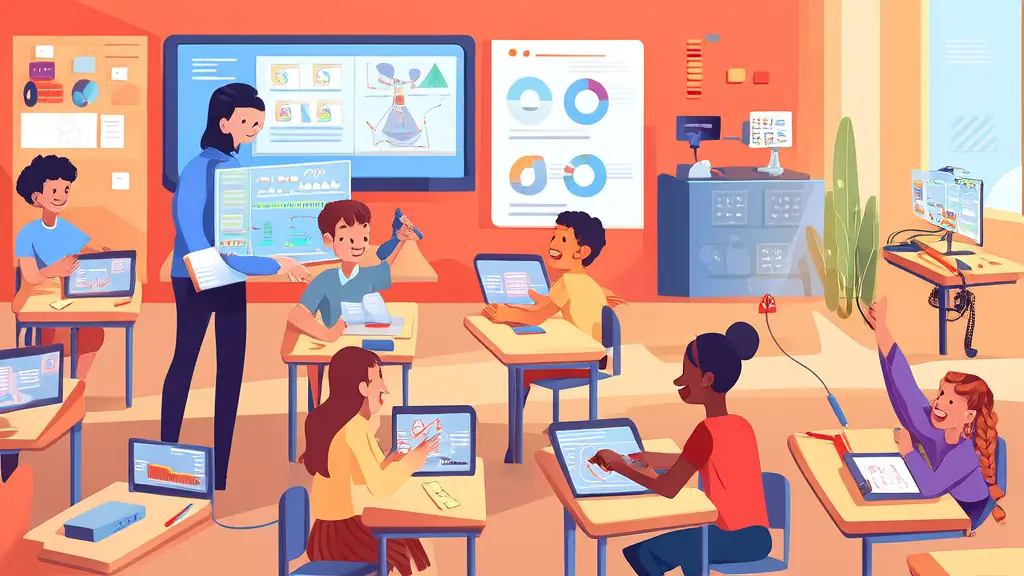
www.uitgedu.com | 自然英语拼读 | KET | PET | 英语点读学习资料
Empowering the Next Generation: Navigating K12 Education in 2025
Welcome to the future of education! As we stand on the brink of a new era, it's essential for parents and educators to stay informed about the latest trends, methodologies, and technologies that are shaping K12 education. This post will explore the most effective teaching strategies, delve into recent child development research, highlight educational technology advancements, and provide practical tips to support our children's learning journey. Let’s dive in!
The Power of Project-Based Learning (PBL)
Project-Based Learning (PBL) has emerged as one of the most effective teaching methodologies in recent years. Unlike traditional rote learning, PBL encourages students to engage in real-world projects that require critical thinking, problem-solving, and collaboration. For example, a group of 8th graders might design and build a sustainable city model, integrating concepts from science, math, and social studies. Research shows that PBL not only enhances academic performance but also fosters a deeper understanding and long-term retention of knowledge.
Understanding Child Development: Insights from Recent Research
Recent studies in child development have shed light on the importance of emotional and social skills in addition to cognitive abilities. The Collaborative for Academic, Social, and Emotional Learning (CASEL) emphasizes the need for schools to integrate social and emotional learning (SEL) into their curricula. SEL programs help students develop self-awareness, self-management, social awareness, relationship skills, and responsible decision-making. For instance, a school in California implemented an SEL program that resulted in a 20% reduction in disciplinary incidents and a 10% increase in student engagement. By fostering these skills, we can better prepare our children for success both in and out of the classroom.
Educational Technology Trends: Enhancing the Learning Experience
Technology continues to play a pivotal role in K12 education, with new tools and platforms emerging to enhance the learning experience. One of the most promising trends is the use of adaptive learning systems, which tailor instruction to each student's individual needs and pace. For example, DreamBox Learning uses algorithms to adjust the difficulty of math problems based on a student's performance, ensuring that they are always challenged but not overwhelmed. Additionally, virtual reality (VR) and augmented reality (AR) are being used to create immersive learning experiences. A biology class might use VR to take a virtual field trip to the Amazon rainforest, allowing students to observe and interact with the ecosystem in a way that textbooks cannot replicate.
Practical Tips for Parents and Teachers
As parents and educators, there are several steps we can take to support our children's learning and development:
- Encourage curiosity and exploration: Create opportunities for your child to ask questions, experiment, and learn through hands-on activities.
- Promote a growth mindset: Emphasize the value of effort and perseverance over innate ability. Encourage your child to view challenges as opportunities for growth.
- Stay connected with teachers: Regular communication with your child's teachers can help you stay informed about their progress and address any concerns promptly.
- Integrate technology thoughtfully: Use educational apps and online resources to supplement learning, but ensure that screen time is balanced with other activities.
Success Stories and Case Studies
One inspiring success story comes from a public school in New York City, where a focus on PBL and SEL transformed the school culture. The school implemented a project-based curriculum that required students to work on community service projects, such as organizing a food drive and designing a local park. These projects not only improved academic outcomes but also fostered a sense of civic responsibility and empathy among students. Another case study involves a rural school in Texas that adopted an adaptive learning platform, resulting in a 30% improvement in standardized test scores and a significant increase in student motivation.
Conclusion: A Call to Action
As we navigate the evolving landscape of K12 education, it's clear that innovative teaching methodologies, a deep understanding of child development, and the strategic use of technology can make a profound difference in our children's lives. By staying informed and actively engaging in our children's education, we can empower them to become lifelong learners and responsible citizens. Let's continue to collaborate, innovate, and inspire the next generation to reach their full potential.
Thank you for joining us on this journey. We look forward to seeing the incredible achievements that lie ahead for our students and our communities.